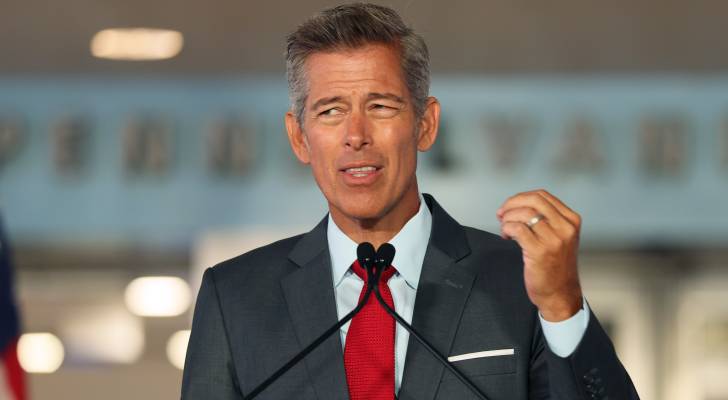
Since the federal government has shut down, the nation’s air travel system has been teetering, and Transportation Secretary Sean Duffy threatened to fire absentee air traffic controllers deemed responsible for causing thousands of flight delays.
Upwards of thousands of flights have been delayed daily across the country since the federal government shut down Oct. 1. Duffy claimed a small group of air traffic controllers were “lashing out” about paychecks being suspended during the shutdown by calling in sick, leading to an increase in the number of delays.
Must Read
- Thanks to Jeff Bezos, you can now become a landlord for as little as $100 — and no, you don’t have to deal with tenants or fix freezers. Here’s how
- Dave Ramsey warns nearly 50% of Americans are making 1 big Social Security mistake — here’s what it is and 3 simple steps to fix it ASAP
- ‘Rich Dad, Poor Dad’ author Robert Kiyosaki says this 1 asset will surge 400% in a year — and he begs investors not to miss its ‘explosion’
“The average was 5% of delays in the national system was from controller staffing shortages,” Duffy told Fox Business on Oct. 9. (1) “At this time, it’s 53% — so a massive rise in the delays are coming from controllers who aren’t coming to work. It’s a problem.”
Air traffic controllers are deemed essential and are required to work even without compensation. Pay for time worked during a shutdown is normally distributed once the government is up and running again. But Duffy says those who are found to be “problem children” may instead be removed from their jobs.
Nick Daniels, president of the National Air Traffic Controllers Association, noted to NPR that staffing levels were “extremely low” already — with only 11,000 of around 14,600 positions filled — and denied controllers were coordinating sick days. (2)
“The longer that this lasts, it’s going to place a continued strain on air traffic controllers. The stress, the pressure. Air traffic controllers have to show up to save people’s lives,” Daniels said. “And if they’re not fit for that duty because they’re worried about, you know, everything that’s going on at home, putting food on the table, gas in the car, making sure their kids are looked after, that’s something that we have to face.”
Airlines are doing what they can to keep passengers moving, but there’s only so much they can do when the federal workforce controlling the skies faces staffing issues. So, do passengers have any recourse if they experience delays during these times?
What travelers can — and can’t — get compensated for
Under Department of Transportation rules, if your flight is canceled or experiences a significant schedule change or delay, you may be entitled to a refund if you choose not to travel. “Significant changes” may include:
Read more: How much cash do you plan to keep on hand after you retire? Here are 3 of the biggest reasons you’ll need a substantial stash of savings in retirement
- Domestic flights departing three hours earlier or arriving three hours later than scheduled
- International flights departing six hours earlier or arriving six hours later than scheduled
- Either the origination or destination airport is changed
- The number of connections is increased
- Passengers are downgraded to a lower class of service
- Connections or airplane changes that are less accessible or accommodating if you are a person with a disability
Each airline also has its own set of rules that may trigger compensation, including meal and hotel vouchers, for delays or rebookings that result from factors within their control. But if a delay stems from things like inclement weather and FAA staffing, which are outside of the airline’s control, they typically aren’t liable.
How to fight for what you’re owed
Start with documentation. Keep a record of every email, text and push notification from your airline, including screenshots that show the reason for the delay. If the airline cancels your flight or makes a significant change to the itinerary, you can choose to reschedule, alternative compensation or get a refund.
If for some reason the airline denies your request, or you’re not satisfied with a solution they offer, consider escalating the issue with the Department of Transportation’s Aviation Consumer Protection office.
Some credit cards and travel insurance policies may also help to cover “trip interruption” or “delay” expenses, reimbursing hotel and meal costs when flights are postponed beyond a set number of hours.
What to read next
- Want an extra $1,300,000 when you retire? Dave Ramsey says this 7-step plan ‘works every single time’ to kill debt, get rich in America — and that ‘anyone’ can do it
- I’m 49 years old and have nothing saved for retirement — what should I do? Don’t panic. Here are 6 of the easiest ways you can catch up (and fast)
- There’s still a 35% chance of a recession hitting the American economy this year — protect your retirement savings with these 5 essential money moves ASAP
- This tiny hot Costco item has skyrocketed 74% in price in under 2 years — but now the retail giant is restricting purchase. Here’s how to buy the coveted asset in bulk
Join 200,000+ readers and get Moneywise’s best stories and exclusive interviews first — clear insights curated and delivered weekly. Subscribe now.
Article sources
We rely only on vetted sources and credible third-party reporting. For details, see our editorial ethics and guidelines.
This article provides information only and should not be construed as advice. It is provided without warranty of any kind.